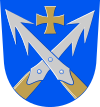Korsnäs
| Korsnäs | ||
|---|---|---|
| Municipality | ||
|
Korsnäs kommun Korsnäsin kunta |
||
|
||
 Location of Korsnäs in Finland |
||
| Coordinates: 62°47′N 021°11′E / 62.783°N 21.183°ECoordinates: 62°47′N 021°11′E / 62.783°N 21.183°E | ||
| Country |
|
|
| Region | Ostrobothnia | |
| Sub-region | Vaasa sub-region | |
| Charter | 1887 | |
| Government | ||
| • Municipal manager | Christina Båssar | |
| Area (2016-01-01) | ||
| • Total | 235.78 km2 (91.04 sq mi) | |
| • Land | 235.65 km2 (90.98 sq mi) | |
| • Water | 1,189.06 km2 (459.10 sq mi) | |
| Area rank | 252nd largest in Finland | |
| Population (2016-03-31) | ||
| • Total | 2,206 | |
| • Rank | 262nd largest in Finland | |
| • Density | 9.36/km2 (24.2/sq mi) | |
| Population by native language | ||
| • Swedish | 91.2% (official) | |
| • Finnish | 3.2% (official) | |
| • Others | 5.5% | |
| Population by age | ||
| • 0 to 14 | 14.8% | |
| • 15 to 64 | 61.4% | |
| • 65 or older | 23.8% | |
| Time zone | EET (UTC+2) | |
| • Summer (DST) | EEST (UTC+3) | |
| Municipal tax rate | 19.75% | |
| Website | www.korsnas.fi | |
Korsnäs is a municipality of Finland. It is located in the province of Western Finland and is part of the Ostrobothnia region.
Korsnäs covers an area of 235.78 square kilometres (91.04 sq mi) of which 1,189.06 km2 (459.10 sq mi) is water. Korsnäs is the most western mainland municipality in Finland. It has a long, rocky coastline along the Gulf of Bothnia. The three largest islands are Halsön, Bredskäret and Södra Björkön, all used as important recreation areas for urban dwellers.
The municipality has a population of 2,206 (31 March 2016). The population density is 9.36 inhabitants per square kilometre (24.2/sq mi). The municipality is bilingual with Swedish as the majority language and Finnish as the minority language. Until 2014 Swedish was the sole official language. 91.2% of the population speaks Swedish, 3.2% Finnish and 5.5% other languages as their first language.
Due to the post-glacial rebound, most of the area that today forms the municipality of Korsnäs stood under water until around 1000 A.D. The first settlement in Korsnäs is assumed to stem from the 13th century. Some place names of Finnish origin (such as Molpe (Moikipää) and Taklax (Takalaksi)) indicate a Finnish-speaking presence in the 13th century, although it is disputed if these people (probably from Häme) only used the area for fishing on a seasonly basis or if they established a proper, but sparse, settlement. Swedish-speaking settlers came to the area in the 13th or 14th century.
In the 2012 Municipal elections Swedish People's Party got 95 percent of the vote.
...
Wikipedia

